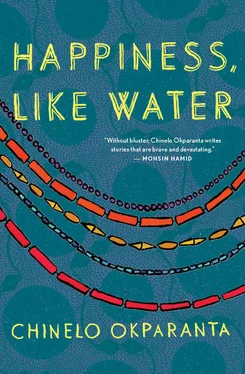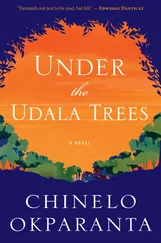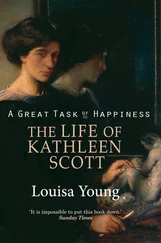The year Mama fell sick was the year Njideka confessed to me that she was a runs girl. I should have known. She walked around campus with shiny silk blouses hanging low on her shoulders, her stilettos making tiny dents in the earth. That year, the runs girls began to circulate the University of Port Harcourt campus. Or maybe they’d always been around. Maybe I only noticed them that year, with their expensive outfits and accessories — money written all over their bodies — because Mama was falling apart, and there was almost nothing I could do.
A bird had flown over our compound with a mouse in its mouth. A black bird, maybe a crow. From the parlour window, we watched it fly. It was lovely and surreal, like a painting. Beautiful blue skies as the backdrop to blackness and death.
The bird dropped the mouse on the ground within a few steps of our front door. We found it that evening, just before sunset. Its tail was twisted around its body, and its pelt was already stiff.
That evening, Mama snapped a branch off the guava tree in our backyard. She used the branch to pick up the mouse and to stick it in a plastic bag. I took the bag with me across the street, across the unpaved road, to the garbage dump there. I tossed the bag into the sea of trash.
Hours later, Mama began to feel sick. If Papa had still been alive, he would have chanted his usual saying: ‘The witch cried yesterday; the child died today. Who does not know the cause of the child’s death?’
But the doctors did not know. And even if they had known, chances are their diagnosis would have had nothing to do with the bird and the mouse. They were scientists, after all — not superstitious, like the rest of us.
It began with pain on the shoulder. Mama decided that for dinner we would have some goat meat in pepper soup, with more than the normal amount of utazi leaves. The leaves made the soup bitter. Mama said that the bitterness, in combination with the pepper, would chase the pain away.
But the next day she could barely move her left arm. We should have gone to the hospital straight away, but Mama said to hold off. They would charge us two thousand naira just to see the doctor. That was the amount they charged the last time we went, when Mama was having all those sweats, followed immediately by chills. That time, the doctors ran their tests and told her she was fine. Two thousand naira wasted and nothing fixed.
There was no telling that the doctors would solve the problem this time. Besides, Mama was certain it was the curse of the black bird — nothing a little praying and Bible reading couldn’t fix, she said. So that second evening we read the Bible together, more fervently than ever.
NEPA had once again taken light away, but there was still a little glow from the sun coming in through the windows of our parlour, which was where we prayed every evening, kneeling on the tile floor, our bodies resting on the seat of the couch. Happy is the man whom God correcteth: therefore despise not thou the chastening of the Almighty: For He maketh sore, and bindeth up: He woundeth, and His hands make whole. He shall deliver thee in six troubles: yea, in seven there shall no evil touch thee . Her voice shook as she read. And the mosquitoes flew about the room, making soft whistling sounds near our ears. Mama must have found the sounds more irritating than usual, because suddenly she was no longer reading, and I was looking up to find her swatting the area around her head. And then she let out a piercing shriek: a sound I hope I never hear again for as long as I live.
When night finally came, Mama’s moaning had still not stopped. Hours passed but there was no sleep for her, and no sleep for me. The pain was somewhere in her torso, she said, on the left side between the upper shoulder and the lower back. She could feel it also in her front. Just as she would expect a heart attack to feel, except there was no indication that her heart was the part in which the crumbling was taking place. It seemed the heart would be just fine, she said. Yet I observed the signs; all of them were far from promising.
In the end it was I who forced her to go to the hospital. We walked out the door early the next morning, taking small steps, my hands fastened securely around her waist.
‘Slower, Ada,’ Mama said.
I tightened my grip on her. ‘Ndo,’ I said. Sorry.
We took a taxi to the teaching hospital, one of those threewheeled keke napeps that looked like something in between a minivan and a motorcycle. The roads were riddled with potholes, and in the keke napep, small as it was, we felt every one of those holes. Each time the vehicle bounced, Mama let out a yelp. And then she’d look at me, her eyes repentant, as if she’d somehow misbehaved.
I should have consoled her more. I should have told her I loved her. But how? Aside from prayers and practical exchanges, we rarely even talked those days just before she fell ill. I was busy with my studies, and she was busy with the market. And so there were silences, as if we no longer valued spoken words, as if spoken words were gaudy finishes on a delicate piece of art, unnecessary distractions from the masterpiece, whose substance was more meaningfully experienced if left unornamented.
There was no longer the Mama who used to tie her scarves on my head, making bows or floral designs out of the tailpieces. No longer the Mama who used to take me on long strolls around the neighbourhood, buying me corn and native pear or roasted bole. Those days, she’d tell me jokes and we’d laugh out loud as if we were the only people in the world. Some nights, she’d even rub a little lipstick on my lips, and she’d take me to Papa and say, ‘Look how beautiful our daughter is!’ And Papa would say, ‘She’s beautiful even without all that lipstick.’ Mama would nod. ‘Of course,’ she’d say. ‘But every girl needs to learn how to put on lipstick.’ And we’d laugh, and I’d dance around and pucker my lips at Papa. He’d smile and humour me, until I grew tired of the show.
That Mama disappeared soon after Papa died. Year after year, she had grown less gregarious. Her mind was always on the market; how we would make money from the crops she sold to pay for this and for that. Of course, I understood her worry. Papa had gone and left us to fend for ourselves in a world where it was hard for a woman to do so honestly.
If I had tried to tell her I loved her on our taxi ride that day, it would not have made things any better. I would not have even known how to say it. Mama, I have something to say? Or, Mama, I’m not just saying this because you’re sick. I really feel it. Do you feel it for me, too? Or, simply, Mama, I love you . No matter how I said it, it would have felt contrived, because we no longer said such tender things. And so I remained silent, only patting her lap gently each time the pain caused her to cry out.
I sat on a chair in the corner of the examination room. The fan buzzed on the ceiling, and the fluorescent lights above were shining bright.
A bald-headed doctor entered the room. He took her blood pressure, which he reported was just fine. Then he unbuttoned her shirt, just enough so that he could take a look at her chest. Her skin was a light shade of brown, and it was easy to see that there was redness and swelling in the area around and below her left shoulder. And in the corner where her sternum met the clavicle, just beneath her neck, there was a bulge.
He tapped around those areas. Every time he tapped, she yelped.
‘We’ll have to run some tests,’ the doctor said.
We walked down two sets of crowded hallways, descended two flights of concrete stairs, with flies buzzing, children crying and Mama moaning.
Читать дальше












